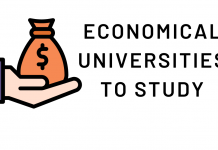Thinking about career ahead? The most common question asked by the young graduates these days is ‘Should I go for an MBA or MS after Graduation?’ Especially the engineers who have just finished their graduation or are in final year of the engineering face this dilemma which one to choose MBA or MS after Engineering. In this post, we will try to evaluate the different aspects of MBA vs MS.
First and foremost, we need to understand the career path of an engineer, which most of the engineers tread. After engineering, students have the following options to select:
- Go For MS
- Apply For MS after Work Experience
- Opt For MBA immediately
- Gain Work Experience for some years and then apply for MBA
Before you decide one of the options stated above you have ask a few questions to your own self:
- What are your short-term career goals?
- What are your long-term career goals?
- Where would you like to settle after you finish the Masters?
- What kind of role you would like to play in any organization where you would be working five years down the line?
The answer to the above questions will give your mind some food for thought which will help you to choose rationally between MBA Abroad and MS Abroad. You can’t afford to choose one of the options haphazardly. Your decision should be on the basis of facts, figures and the most important thing your own instinct. Whether you should go for MBA or MS after Bachelor’s, should be your own decision as you are the best person to judge what is ‘The Best’ for you. So, listing here some of the factors which will help you to take an informed decision about MS Vs MBA.
MBA vs MS which is better?
The following factors of evaluation will help you to make calculations for your career plan:
Passion And Ambition
If your passion and ambition is to gain:
- Further specialization and in-depth technical knowledge in your field area
- Become a technical expert
- Contribute to the product and technology development
- Hate to do business planning on daily basis then you can go for MS immediately after graduation in engineering.
Some students prefer to go for MS after gaining some work experience because of obvious financial constraints. So, if you are a hard-core technical person, you should be preparing to apply for your MS degree.
On the other hand, if you are looking for a degree which is designed to help you:
- To acquire the skills required to run day to day operations of a business.
- Out of Box Thinking
- Practical and Interactive Approach towards real life problems.
- Skills to manage human resource as well as other resources of the organization then MBA is a sure bet.
A candidate is expected to have a minimum of 3-4 years of work experience in order to be able to contribute to the class and thus help in adding value to the core ideas of the B-Schools.
So, if you feel that you will be more valuable to the organization while managing resources, you can go for MBA after gaining some work experience.
Career Goals
It is very important to plan about your career goals. You can take a paper and start writing about your short-term as well as long-term career goals. So, decide about your career goals and then evaluate both the options.
- Better suited for to be Product Developers, Product Engineers.
- If someones wants to be Product Manager or get into Brand Management – an MS degree holder needs to work 4 – 7 years.
- If someone wants to be a successful entrepreneur or Top Consultant (Technical or Management) – working 4 to 10 years is required (ideally) for MS holders
- Ideal for Researchers and R&D professionals
- In case you want to be CEO or Technical Director, PhD might be required after MS.
- In any case, MBA accelerates the time process. If someone wants to within Top Management role, the timeline can be reduced up to 60%
- During MBA, you get access to a diverse network of professionals (who will be having 2 – 7 years of work experience from diverse background), venture capitals, mentors and startup incubators. All these are valuable for getting started for entrepreneurship. MBA graduates start their ventures within 2 years of graduating. Whereas for MS holders , it might be 5 – 10 years.
- MBA is expensive – but ROI can be good; you can be earning USD $250,000 per annum after finishing your MBA
- Ideal for wanna be CEO or even Technical Director
- Top Brands (especially Consulting Firms) ask for MBA (mandatory)
- People also do MBA after MS in order to get that big jump in career
Entry Requirements
This is another factor which plays a vital role in deciding whether to go for MS or MBA after work experience.
The Entry Requirements For MS:
- A Good Bachelor’s degree
- Excellent GRE score (if applying to US, Singapore and few programs in Germany & Canada; NOT mandatory for other countries)
The Entry Requirements For MBA:
- A Bachelor’s degree
- 2 – 4 years of work experience with brilliant track record and professional accomplishments (the bar might be higher for European MBA programs)
- Decent GMAT score (at least in the region of 650)
- Professional Recommendations: It is mandatory to provide at least 2 to 3 Professional Recommendations. Failing to which you won’t be able to get get admission in a good B-School.
Also, these days many good B-Schools have also started accepting GRE scores for MBA programs. So, the candidates can appear for GRE and apply for the B-Schools as well. In majority of Indian companies (especially private and public sector), it is little bit hard to get good recommendations on Paper or Online. Sometimes, you need to chase your referee (who could be VP, CEO or Senior Manager – hence too busy) to post a Letter (LOR hard copy) to US or Europe, or send a referee report using their official email-account (not Yahoo, Gmail or Hotmail).
Costs
The major deciding factor for many Indian students as many of us depends upon our parents to fund our education. The cost difference is also huge but there are options available to help the students.
MS:
- Costs: INR 3 Lakhs – 20 Lakhs
- Scholarships (full and partial) are available
MBA:
- Costs: INR 15 Lakhs – 70 Lakhs (can cost upto 1 Crore as well)
- Limited (and very competitive) scholarships
So, you can see yourself the difference between the two courses. But the bottom line is that you should know your inclination and interests before deciding about MBA vs MS. You are the one who is going to live this life and make utmost out of your situation is what we recommend to all the students.
So, If you have technical bend of mind, you can go for MS or if you have an aptitude for managerial skills you can go for an MBA. In the long term, it’s your career goals what matters. You should choose the higher education degree which is in-sync with your goals, passion, ambition and necessities. Don’t be part of the ‘herd’, stand out of that herd and choose what is best suited to you.
We hope that the above evaluation will help you to decide what is right and best for you, MS or MBA after work experience. If you have any queries or doubts you can always talk to our experts who are there to guide you and help you in taking a rational decision.
You should also watch the following video, which might help you further to take a decision.
Also Check:
- Cost of doing MBA from the USA
- Cost of doing MBA from the UK
- MBA Application Deadlines for 2017 in Top Universities
- Top MBA Colleges in the World
- MBA from Oxford University
- MBA Admission without GMAT Score
- MS Application Deadlines for Spring 2017
- Top Universities for MS in US
- MBA Admission Without GMAT in top Business Schools
- MS Admission without GMAT/ GRE




















































